The Zhou Dynasty (周, Zhōu), which ruled China from 1046 to 256 BCE, was one of the most significant and longest-lasting dynasties in Chinese history. It was preceded by the Shang Dynasty and followed by the Qin Dynasty (秦, Qín), and it saw great advancements in Chinese agriculture, education, military organization, Chinese literature, music, philosophical schools of thought, and social stratification as well as political and religious innovations.
This article will explore the history of the Zhou Dynasty, its major achievements, and its legacy.
History
Origins of the Zhou Dynasty
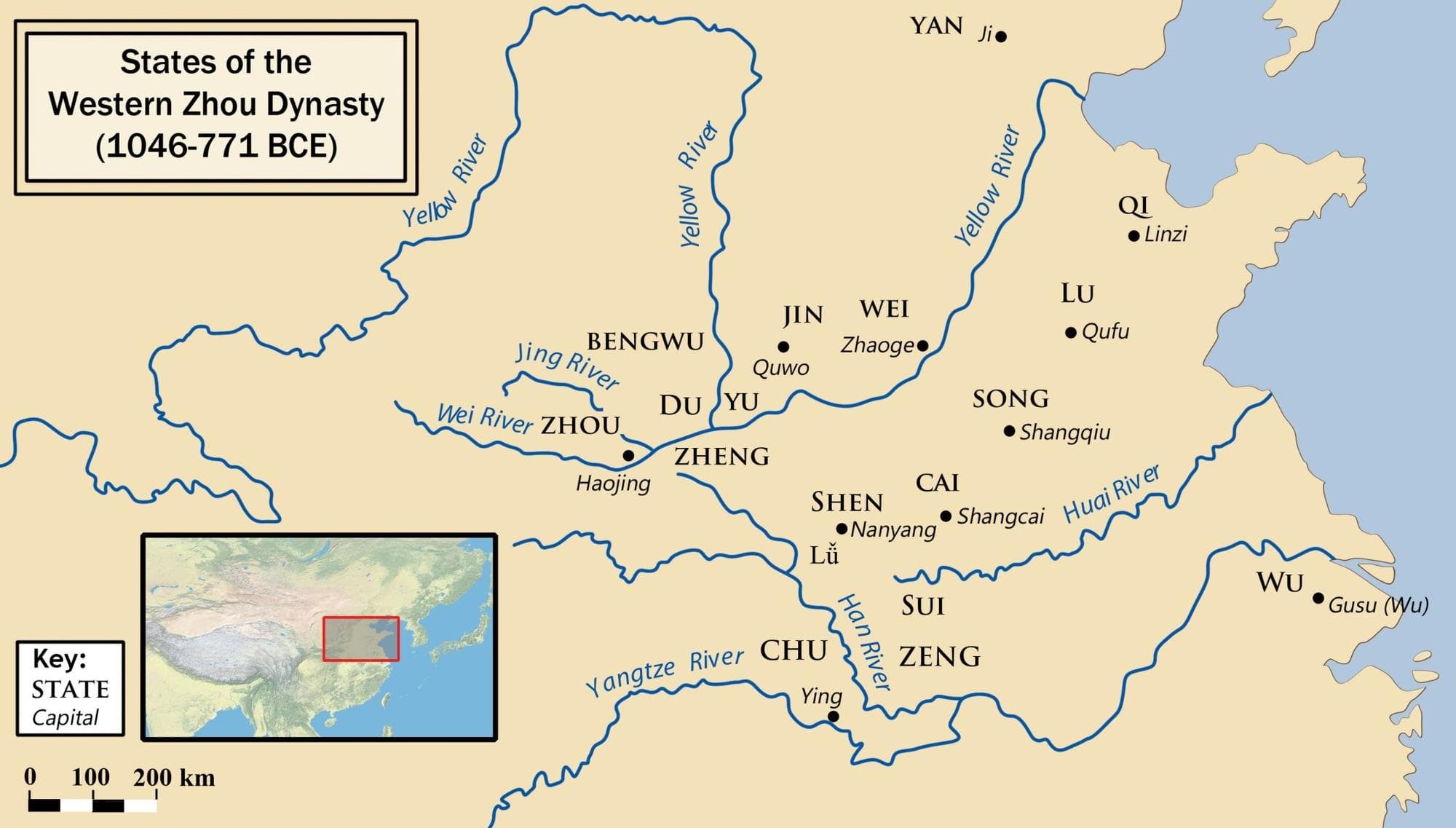
Map of the Western Zhou Dynasty
The Zhou Dynasty was founded by King Wu (周武王, Zhōu Wǔ Wáng), who overthrew the last Shang emperor, Di Xin (帝辛, Dì Xīn, also known as 纣, Zhòu), in 1046 BCE. King Wu's family had been powerful in the Shang Dynasty, and he was able to rally support from other regional powers to overthrow the Shang. After his victory, he established the Zhou Dynasty and moved the capital to the city of Haojing (镐京, Hǎo Jīng, present-day Xi'an, 西安).
The Zhou Dynasty is traditionally divided into two periods: the Western Zhou (1046-771 BCE) and the Eastern Zhou (770-256 BCE). The Western Zhou was a period of relative stability and prosperity, while the Eastern Zhou was characterized by political fragmentation and the emergence of rival states.
The Spring and Autumn and Warring States Periods
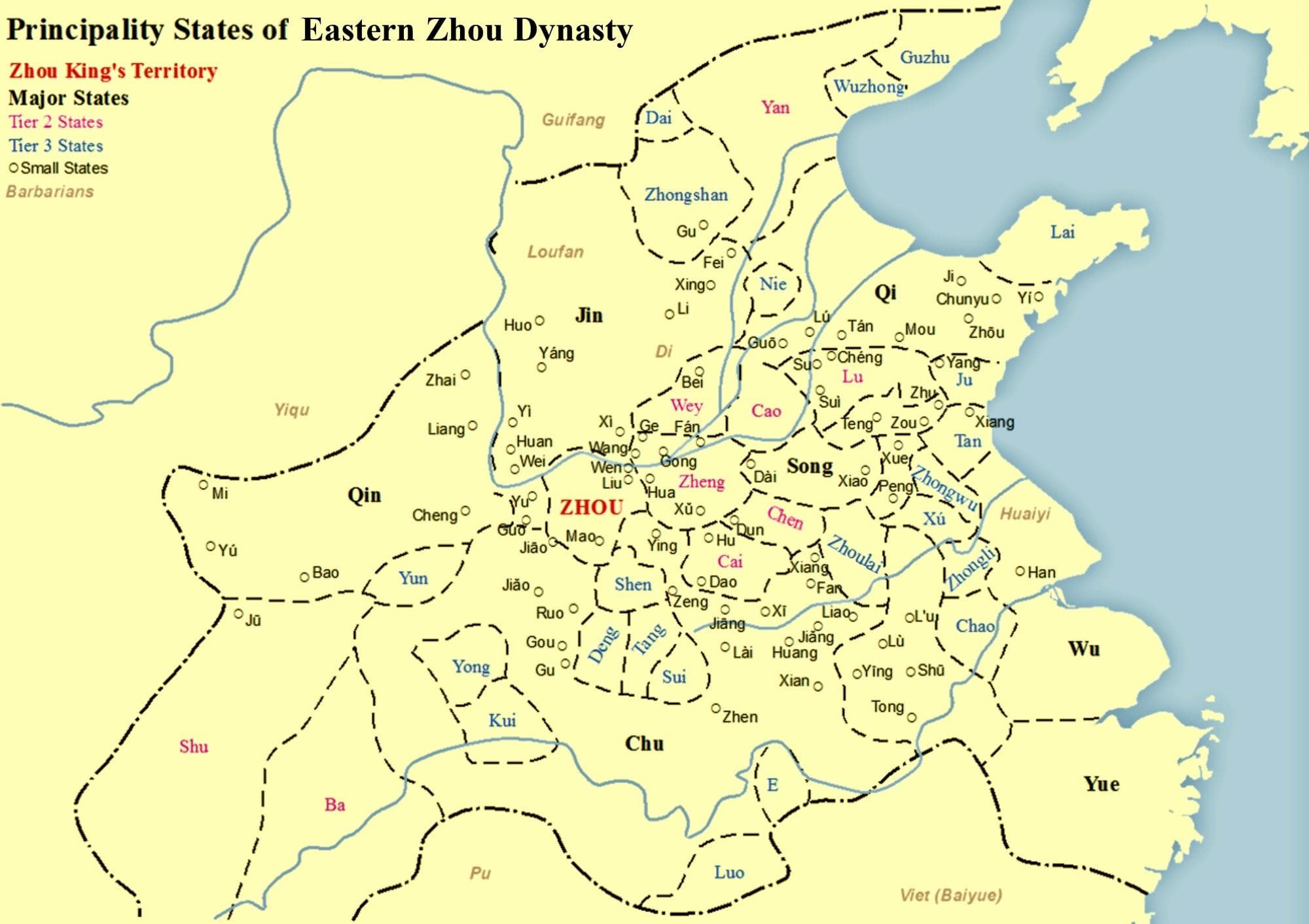
Map of the Eastern Zhou Dynasty
The Eastern Zhou Dynasty is further divided into two sub-periods: the Spring and Autumn Period (春秋, Chūn Qiū, 770-476 BCE) and the Warring States Period (战国, Zhàn Guó, 475-221 BCE). Note that the Warring States Period continued after the fall of the Zhou Dynasty (in 256 BCE). These periods were marked by political fragmentation, social upheaval, as well as significant cultural and intellectual developments.
The Spring and Autumn Period saw the rise of independent states and the decline of the centralized power of the Zhou Dynasty. The period was named after the historical text, the Spring and Autumn Annals (《春秋》), which documented the events of this time. During this period, philosophers such as Confucius (孔子, Kǒng Zǐ) and Laozi (老子, Lǎo Zǐ) emerged, and the Hundred Schools of Thought (诸子百家, zhū zǐ bǎi jiā), a diverse collection of philosophies and schools of thought, flourished.
The Warring States Period followed the Spring and Autumn Period and was characterized by intense warfare and competition between the various states that emerged during the previous period. The name "Warring States" is taken from the Annals of the Warring States (《战国策》) compiled and annotated by Liu Xiang (刘向) in the Western Han Dynasty (西汉, Xī Hàn).
During this period, the constituent states of the Zhou Dynasty engaged in incessant warfare with each other, with the Zhou court exerting little control over them until the Qin state (秦国) consolidated power and formed the Qin Dynasty (秦朝) in 221 BCE. However, by this time, the Zhou Dynasty had already collapsed 35 years earlier in 256 BCE.
Political Structure
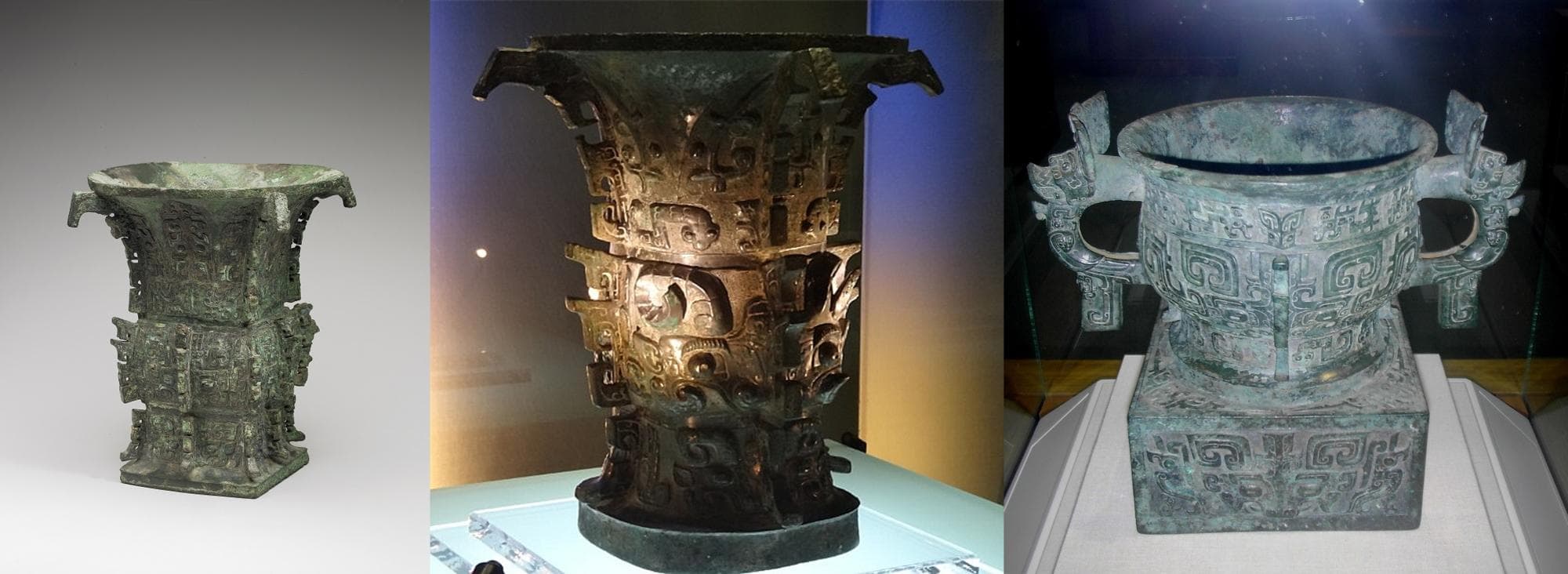
Bronze vessels with inscribed records showing events related to Zhou's political structure
The Zhou Dynasty was a feudal system, with the king at the top and local lords (or dukes) below him. The lords were given land in exchange for loyalty and military service, and they were responsible for administering their territories and collecting taxes. The king was responsible for coordinating military campaigns, managing the central government, and performing religious rituals.
The king was seen as the link between heaven and earth, and he had a priestly role in addition to his political responsibilities. The Zhou Dynasty was founded on the concept of the Mandate of Heaven, which held that the king had the divine right to rule as long as he governed justly and effectively. If a king failed to do so, he could lose the Mandate of Heaven and be overthrown.
Achievements
The Zhou Dynasty was among the most enduring and influential dynasties in Chinese history. It was a period marked by significant progress in social, cultural, technological, and economic realms, contributing to the shaping of Chinese civilization for generations to come.
During the Western Zhou period, iron tools and weapons were developed, leading to increased agricultural productivity and military power. The Chinese writing system, which had been developed during the Shang Dynasty, was further refined and standardized.
The Zhou Dynasty was also a period of great cultural flourishing. Confucius, one of China's most famous philosophers, lived during the Eastern Zhou period and developed his ideas about ethics, morality, and social order. The Taoist and Legalist schools of thought also emerged during this time.
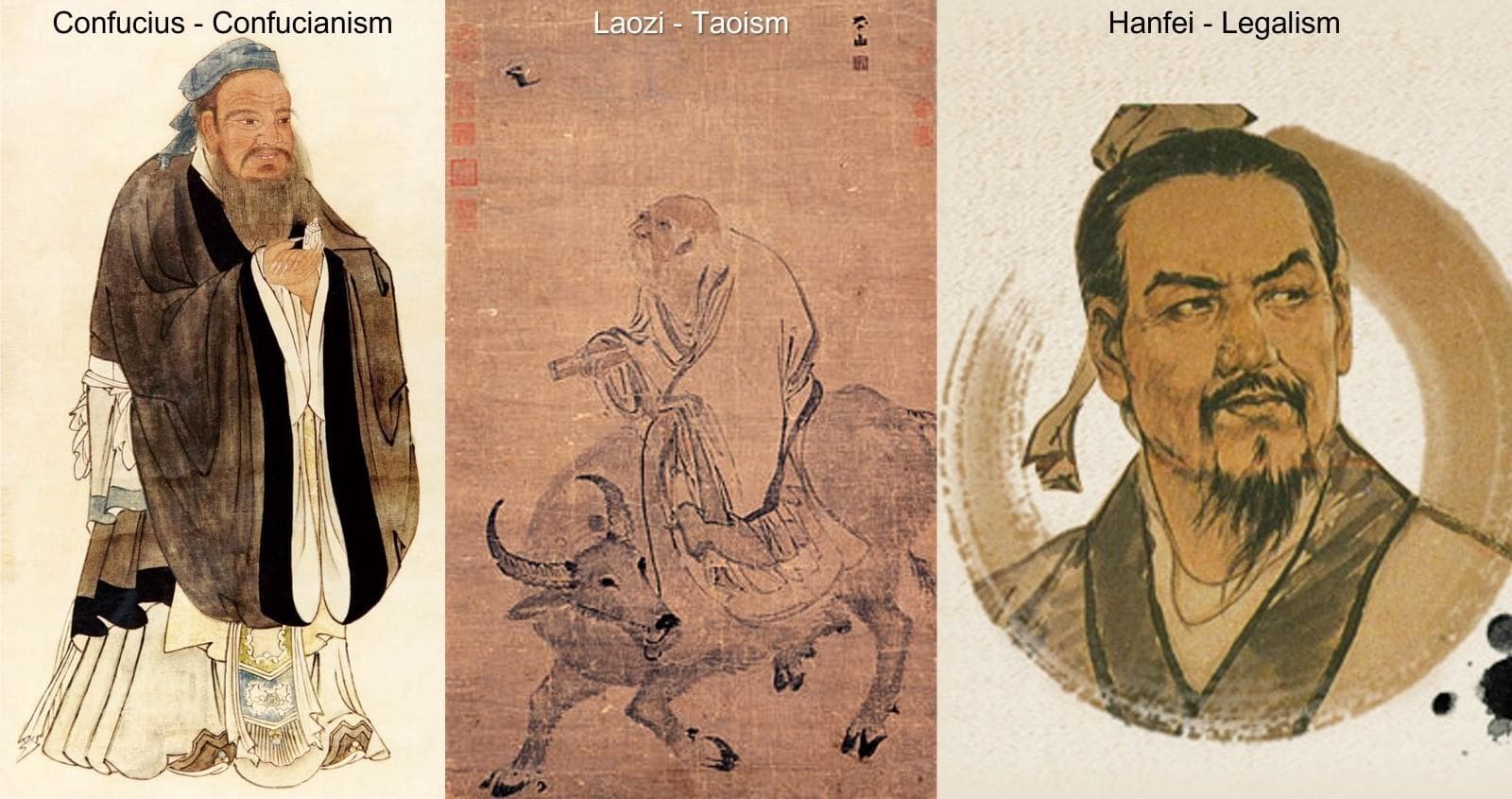
Portraits of famous philosophers from the Zhou Dynasty
In addition, the Zhou Dynasty oversaw significant economic development, including the expansion of agriculture, the development of a sophisticated trade network, and the introduction of a standardized system of currency and taxation.
The Zhou Dynasty also made important contributions to the development of astronomy and astrology, which helped to shape Chinese beliefs and culture for centuries to come.
For a better demonstration, a list of the important achievements of the Zhou Dynasty is given below:
1. The Mandate of Heaven: The Zhou Dynasty established the concept of the Mandate of Heaven, which asserted that a just ruler had the divine right to rule and that if a ruler was unjust or failed to govern well, he could lose this mandate and be replaced by a more virtuous ruler.
2. Feudalism: The Zhou Dynasty introduced a feudal system of government, which divided the empire into territories controlled by regional lords, who owed allegiance to the emperor. This system helped to decentralize power and promote stability in the empire.
3. Ironworking: The Zhou Dynasty was known for its advances in ironworking, which allowed it to produce stronger and more durable tools and weapons. This technological advancement had a significant impact on agriculture, warfare, and daily life in ancient China.
4. Philosophy: The Zhou Dynasty was a time of great intellectual and philosophical development in China. Confucianism, Taoism, and Legalism all emerged during this period.
5. Literature: The Zhou Dynasty was also a time of great literary achievement. The Book of Songs (《诗经》), a collection of poems, was compiled during this period, as were other important works such as the Book of Changes (《易经》, also named 《周易》), the Art of War (《孙子兵法》) and the Book of Documents (《尚书》). This is also the time that saw the emergences of Yin Yang (阴阳), Bagua or Eight Trigrams (八卦), and Wuxing or Five Elements (五行).
6. Religion and Divination: The Zhou Dynasty inherited aspects of the Shang religion and divination, but developed further on that basis. The Book of Changes mentioned above, for example, was used for divination purposes and is still studied and revered by many Chinese today.
7. Calendar and Astronomy: The Zhou Dynasty developed a sophisticated lunisolar calendar, which was based on the cycles of the moon and the sun. It also made important observations of the movements of the sun, moon, stars, and plants, and used this knowledge to develop astrological theories and predictions. This was in part driven by the Mandate of Heaven, as the rulers claimed their authority came from heaven and made great efforts to gain knowledge of the astronomical system, on which they also based the calendar.
8. Writing: The Zhou Dynasty continued to use the ancient script known as the oracle bone script, but they also developed a new form of writing called seal script. Seal script was used for official documents and inscriptions, and it eventually evolved into the modern Chinese writing system.
9. Irrigation: The Zhou Dynasty oversaw the construction of sophisticated irrigation systems, which helped to improve agricultural productivity and support the growth of urban centers.
10. Urbanization: During the later years of the Zhou Dynasty, China saw significant urbanization, as cities grew in size and complexity, and trade and commerce flourished. The Zhou Dynasty constructed a network of roads and canals. In addition, a standardized system of currency using bronze coins with standardized weights and denominations was introduced. All of these helped to facilitate trade and commerce throughout the empire.
Legacy
The Zhou Dynasty left a significant legacy that has had a profound impact on Chinese civilization and culture and is still felt in China today.
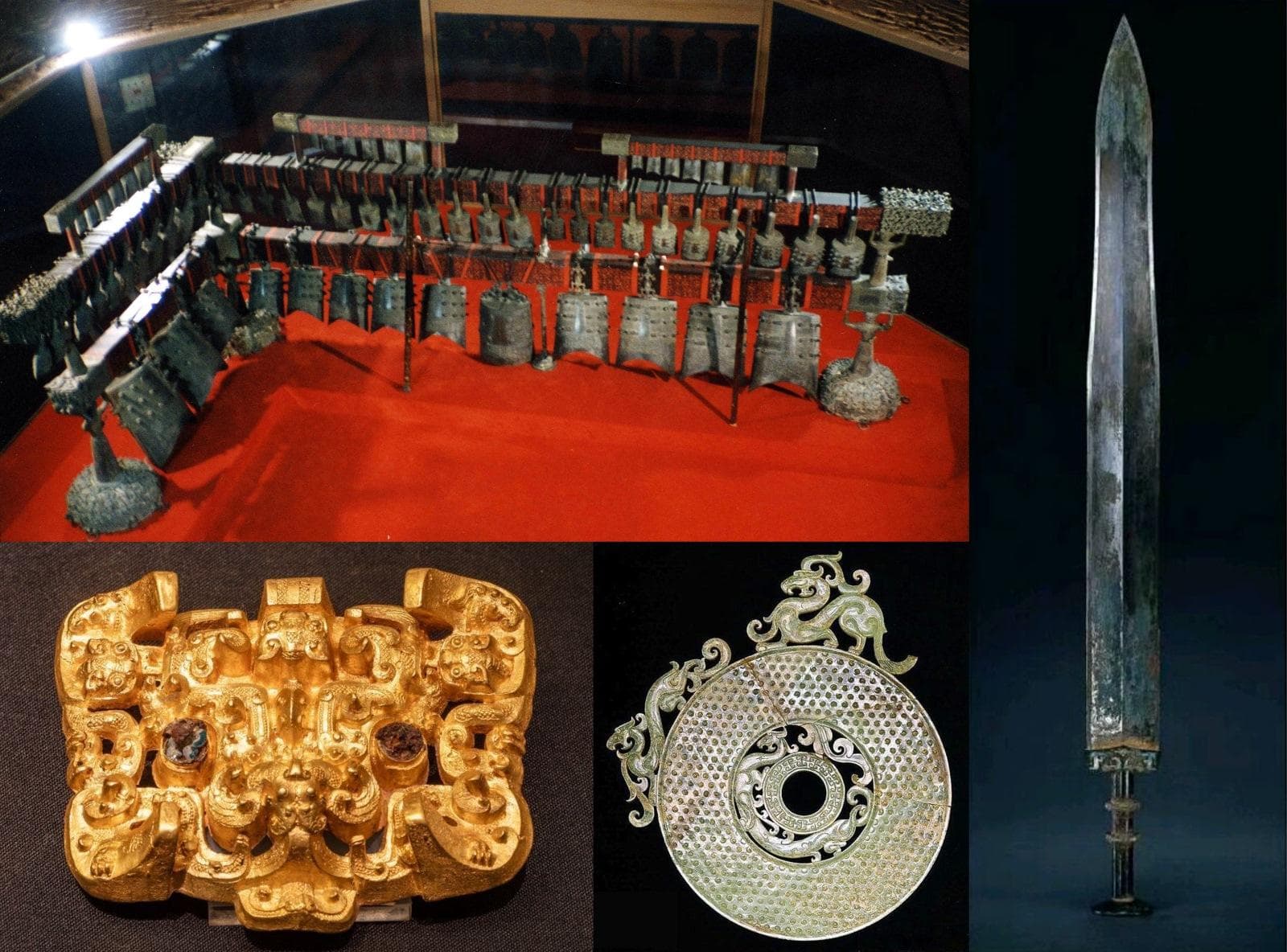
Artifacts and items from the Zhou Dynasty
1. Political and Social Organization
The Zhou Dynasty established a system of government and social organization that would continue to shape Chinese society for centuries to come. It laid the foundation for the Chinese imperial system, which would endure for over two millennia. The system of feudal lords and central government that the Zhou Dynasty established provided a model for subsequent Chinese dynasties, and the idea of the emperor as the divine link between heaven and earth continued to shape Chinese political and cultural norms.
2. Cultural Achievements
The Zhou Dynasty was a period of significant cultural development, which included the creation of new forms of art, literature, and music. Many of these cultural achievements continue to be celebrated and admired in China today.
The concepts of Confucianism and Taoism, which were developed during the Zhou Dynasty, also had a lasting impact on Chinese philosophy, ethics, and morality. Confucianism especially has had a profound impact on Chinese culture, and Confucian values such as respect for authority, social harmony, and filial piety continue to be influential.
3. Technological Advancements
The Zhou Dynasty made significant contributions to the development of technology in ancient China, particularly in the areas of ironworking, irrigation, and writing. These technological innovations helped to improve daily life for the people of ancient China and laid the foundation for further technological advancements in the centuries to come.
4. Economic Expansion
The Zhou Dynasty oversaw significant economic expansion and development, which helped to establish China as a major economic power in the ancient world. The expansion of agriculture, trade, and industry helped to support a growing population and laid the foundation for the continued economic development of China in the centuries that followed.
5. Legacy of Ideas
The Zhou Dynasty's legacy is not limited to political, cultural, technological, and economic achievements. It also includes a legacy of ideas, such as the concept of the Mandate of Heaven, which shaped Chinese beliefs about government and the relationship between rulers and the ruled and has continued to influence Chinese politics and society.
The Zhou Dynasty was a critical period in Chinese history, characterized by political stability, cultural flourishing, and technological advancement. Its legacy continues to shape Chinese society today, and its achievements in fields such as agriculture, writing, and art laid the foundation for the great accomplishments of subsequent Chinese dynasties.